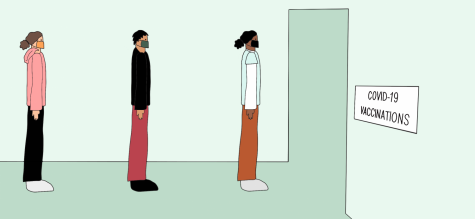“If you can get it, get it”: Everyone above 16 eligible for the vaccine in Washington
April 15, 2021
All Washington residents aged 16 years and above are now eligible to receive vaccination against COVID-19, according to the Washington State Department of Health (DOH). Teenagers aged 16 or 17 may need to be granted consent from parents or guardians.
The Whitman community seems to have gotten a head start through volunteering at the local clinic. On April 2, Whitman Today emailed the results of a poll that asked respondents whether they had already received the vaccine. Out of the 334 responses, 74% said they had already received the vaccine, while 24% said that they will receive it when they are eligible.
Walla Walla is now in Phase 3 of the Washington State Roadmap to Recovery. Within the county population of 62,200, 39,158 vaccination doses have been given as of April 11. Vaccination slots can now be booked by anyone above the age of 16. 33% of the population is at least partially vaccinated, while 21% of the Walla Walla population is fully vaccinated.

Yet, the accelerating inoculation program comes as COVID-19 transmission and daily case counts rise across the state. The biggest increase in the number of cases is among younger people, aged 10 to 49. There is a lower rate of increase in the number of cases among age groups 0 to 9 and 50 to 69.
While cases are rising, the report shows a decline in hospitalization for severe illness after contracting the virus. The DOH’s statewide situation report suggests that the decline in hospitalization is a result of more people receiving the vaccine. Hospital admission rates of people above 60 years old, one of the first groups to get vaccinated, declined after vaccination.
Tony Pham, a student from the Gateway Program between Whitman and Walla Walla Community College, believes that people should now prioritize receiving their vaccination.
“The reason why we got it done so fast is because we have the advancement, a number of good science workers and pharmaceutical workers who actually know what they are doing,” Pham said.
He lives in Walla Walla with his family, and has observed that members of the community are often found not following COVID-19 guidelines.
Pham wasn’t able to get the vaccine until April 15, because of the eligibility criteria, and he is the only member from his family who is yet to be vaccinated. He stated that it is probably for the best if everyone gets the vaccine as soon as they can.
“If you can get it, get it,” Pham said.
Nadiia Balbek, a first year international student from Ukraine, also shared her excitement and anxiety related to the vaccine. Balbek says that the college has so far handled COVID-19 well, and most of her peers follow restrictions.
“[Vaccination] really is sooner than expected, and I am excited,” Balbek said.
The country’s rapid and successful vaccination distribution contrasts the situation in Balbek’s home country of Ukraine. Due to the comparative ease in getting a vaccine in Washington, she expressed her gratitude.
“I feel thankful and privileged,” Balbek said.
Despite the availability of vaccines, the DOH has urged people to be responsible for their behavior as Washington continues to see a rise in transmission cases.
“As we work to get more and more people vaccinated, our collective behavior still matters a lot. Right now, 80% of our state’s population is still susceptible to the virus, and we’re seeing increasing circulation of variants that spread more easily,” Acting State Health Officer Scott Lindquist said in a DOH news release. “This is particularly concerning when we’re already working from a higher baseline than we saw before previous waves. These restrictions won’t last forever, but they are still needed as we work to vaccinate more people.”
Josh Jensen, Whitman’s Vice President of Enrollment and Communications, also mentioned in an email to The Wire that the speed of the vaccine rollout gives the community a reason to be optimistic. Nevertheless, school COVID-19 guidelines will stay intact.
“We aren’t yet at the point where we are ready to adjust our guidelines, and aren’t yet at the levels of vaccination that would provide the level of immunity necessary to relax our COVID-19 guidelines,” Jensen said, “Because of this, and because of the fast spread of highly-contagious variants, we plan to keep our existing COVID-19 guidelines in place through the end of semester.”




